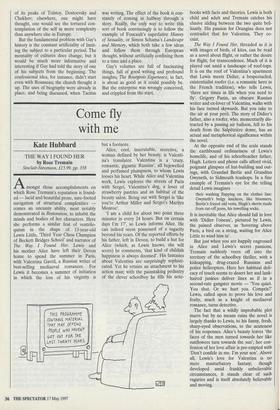Come fly with me
Kate Hubbard
THE WAY I FOUND HER by Rose Tremain Sinclair-Stevenson, £15.99, pp. 358 Amongst those accomplishments on which Rose Tremain's reputation is found- ed — lucid and beautiful prose, sure-footed navigation of structural complexities comes an uncanny ability, most notably demonstrated in Restoration, to inhabit the minds and bodies of her characters. Here she performs a similar feat of ventrilo- quism in the shape of 13-year-old Lewis Little, 'Third Year Chess Champion of Beckett Bridges School' and narrator of The Way I Found Her. Lewis and his mother Alice have left their Devon home to spend the summer in Paris, with Valentina Gavril, a Russian writer of best-selling mediaeval romances. For Lewis it becomes a summer of initiation in which the loss of his virginity is but a footnote.
Alice, cool, inscrutable, secretive, a woman defined by her beauty, is Valenti- na's translator. Valentina is a 'crazy, romantic, gigantic Russian', all bejewelled and perfumed plumpness, to whom Lewis looses his heart. While Alice and Valentina work, Lewis explores the streets of Paris with Sergei, Valentina's dog, a lover of strawberry pastries and an habitud of the beauty salon. Being out with Sergei is 'like you're Arthur Miller and Sergei's Marilyn Monroe'.
`I am a child for about two point three minutes in every 24 hours. But on certain days I'm 17', so Lewis informs Alice. He can indeed seem possessed of a sagacity beyond his years. Of the reported efforts by his father, left in Devon, to build a but for Alice (which, as Lewis knows, she will scorn) he comments, 'that kind of childish happiness is always doomed'. His fantasies about Valentina are surprisingly sophisti- cated. Yet he retains an attachment to his action man; with the painstaking pedantry of the clever schoolboy he fills his note- books with facts and theories. Lewis is both child and adult and Tremain catches his elusive sliding between the two quite bril- liantly. His passion for Orangina does not contradict that for Valentina. They co- exist.
The Way I Found Her, threaded as it is with images of birds, of kites, can be read as a novel about flight, or rather the desire for flight, for transcendence. Much of it is played out amid a landscape of roof-tops. It is on the roof of Valentina's apartment that Lewis meets Didier, a bespectacled, existentialist roofer (i.e. a romantic hero in the French tradition), who tells Lewis, `there are times in life when you need to fly'. Grigory Panin, an obscure Russian writer and ex-lover of Valentina, walks with his face turned skywards. But you take to the air at your peril. The story of Didier's father, also a roofer, who, momentarily dis- tracted by a passing air balloon, fell to his death from the Salp8tri&re dome, has an actual and metaphorical significance within the novel.
At the opposite end of the scale stands the earthbound ordinariness of Lewis's homelife, and of his schoolteacher father, Hugh. Letters and phone calls afford vivid, poignant glimpses of hut-building and out- ings, with Grandad Bertie and Grandma Gwyneth, to Sidmouth teashops. In a fine example of Tremain's eye for the telling detail Lewis imagines
their washing flapping on the clothes line: Gwyneth's bulgy knickers, like bloomers, Bertie's frayed old vests, Hugh's shorts made from cut-off jeans, his towelling socks.
It is inevitable that Alice should fall in love with 'Didier l'oiseau', pictured by Lewis, the pained observer, as 'hovering above Paris, a bird on a string, waiting for Alice Little to wind him in'.
But just when you are happily engrossed in Alice and Lewis's secret passions, Tremain suddenly veers off into the territory of the schoolboy thriller, with a kidnapping, drug-crazed Russians and police helicopters. Here her habitual deli- cacy of touch seems to desert her and lank- haired junkies deliver lines as if in a second-rate gangster movie — 'You quiet. You shut. Or we hurt you. Compris?' Lewis, called upon to prove his love and fealty, much as a knight of mediaeval romance, turns detective.
The fact that a wildly improbable plot marrs but by no means ruins the novel is largely thanks to Lewis, to his funny, fresh, sharp-eyed observations, to the acuteness of his responses. Alice's beauty leaves 'the faces of the men turned towards her like sunflowers turn towards the sun'; her con- fession of her love affair is pre-empted with `Don't confide in me. I'm your son'. Above all, Lewis's love for Valentina is no mere masturbatory fantasy; though developed amid frankly unbelievable circumstances, it stands clear of such vagaries and is itself absolutely believable and moving.


































































 Previous page
Previous page